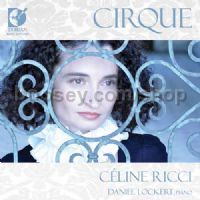Cirque (Dorian Sono Luminus Audio CD)
Cirque (Dorian Sono Luminus Audio CD)
Special Offer
* Estimated price converted from UK retail price
The magic and ambience of a 1920 French street circus comes alive in Cirque, a spectacular collection of works brought to life by soprano Céline Ricci and her pianist and collaborator, Daniel Lockert and presented by Sono Luminus.
In this collection of songs by Georges Auric, Darius Milhaud, Henri Sauguet and Francis Poulenc, the listener is drawn into the world of circus as depicted by the words of Cocteau, Copperie, Pitoëff, Supervielle, Lenormand, Dréjac and even Nostradamus. Through colorful language and clever sounds depicting a carnival-like atmosphere, we hear the words of the fortune-teller, see the girl riding bareback, watch the trapeze artist, hear the horses hooves pounding in the dirt, see into the future.
The references go beyond street life in Huit Poèmes de Jean Cocteau by Georges Auric exploring many new inventions of the 1920’s, citing the “bi-plane combing the clouds”, the clouds circling the Eiffel Tower, the dirigible in the air, along with homage being paid to Erik Satie, the initiator of the new movement of surrealism in music, and the final line in the last poem about “Long live the republic” referring, of course, to the end of the 1st World War.
Two of the cycles on this album are not directly related to the early 20’s, but have a strong connection because of who wrote them. Written considerably later, Six Chansons de Théâtre by Darius Milhaud are wonderful musical illustrations of fragments of theater pieces by three different playwrights. Le Chemin des Forains by Henri Sauguet is actually a song made famous by Edith Piaf, arranged on this album by Daniel Lockert. These two works are representative of the relationship both composers had to their early beginnings. The musical and poetic illustrations of common, everyday life were the driving force behind much of the composers’ output during this period of time, which extended from the early 20’s into the early 50’s. It was a commentary on things ordinary described musically and textually in an extraordinary way. Many of these songs also served as a metaphor for a much larger picture by pushing the boundaries of thought, perception and the relevancy
of man in relation to the world following the devastation of the Great War.
Born in Florence of Italian and French parents, soprano Céline Ricci studied in Paris with Ana Maria Miranda continuing her post-graduate studies at the prestigious Guildhall School of Music and Drama in London. Renowned conductor William Christie selected this gifted artist for his first elite academy, Les Jardin des Voix. She was named one of opera’s promising new talents by Opernwelt. She has subsequently made many appearances under the baton of this conductor and his prestigious Les Arts Florissants and continues to have engagements with them well into the future. Céline Ricci already has an impressive discography including a number of audio recordings and three DVDs. The recent release of Terradellas’ opera Artaserse, singing the role of Arbace, garnered a great deal of critical acclaim. In her character’s 8-minute aria, Opernwelt singled out Ms Ricci’s exciting performance as being a “tour de force” and she was also described as having “faultless breath control, total security and perfect round tone.” This is Céline Ricci’s first solo recording, which also marks her partnership with pianist/collaborator Daniel Lockert.
Daniel Lockert is a multi-talented pianist/collaborator. He was honored as the only American finalist at the first International Accompanying Competition held in Den Hague, the Netherlands. In his role as pianist/collaborator, his wide-ranging career has taken him around the globe, playing throughout the United States, Europe, Japan, Australia and New Zealand. He has been praised for exhibiting a strong sense of rhythm, lovely variety of touches, and a convincing sense of historical style.
In the words of Ms Ricci, “the CD will be very alive and animated in order to give to the listener the possibility of traveling back in time and to have the impression of what it was like on the streets of Paris or at a fair or a play in the 20’s.”




